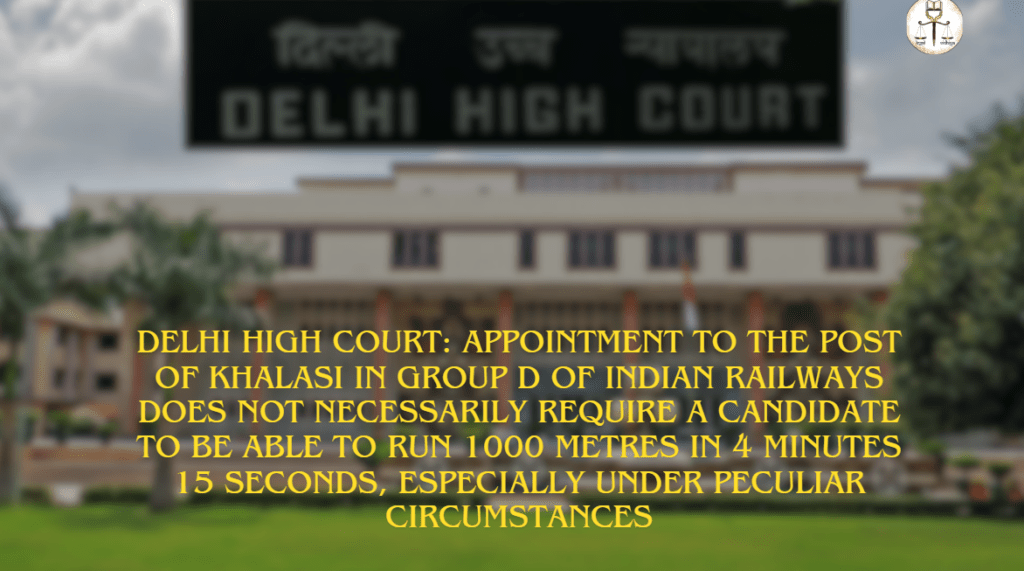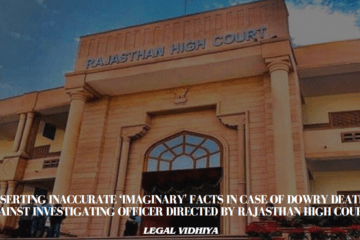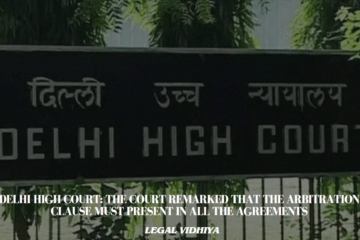
In this case, the Hon’ble Delhi High Court held that the job of a “Khalasi”, often associated with a worker or helper often in the context of manual labour or transportation, and the duties of such a “Khalasi” has no reasonable nexus with the expectation to run 1000 meters in 4 minutes 15 seconds. Thus, in the peculiar circumstances of this particular case, the Hon’ble Delhi High Court dispensed with the requirement of the applicant to run 1000 meters in 4 minutes 15 seconds as part of the Physical Efficiency Test (PET) for being appointed for the post of a Khalasi in Group D.
In this particular case, the petitioners started a recruitment process by issuing a notice dated 30th December, 2013 for filing up 5679 vacancies of Khalasi, a Group D post with a Grade Pay of Rs.1800/-. The method of selection consisted of two step process, where after clearing the written examination, the successful candidates had to undergo PET. The present writ action originated from Clause 10.7 of the instructions pertaining to the invalid applications, which inter alia enumerated that applications without signatures or with signatures in capital letters or with variant signatures at different places would be rejected.
The respondent’s case was that he had applied for the said post of Khalasi and gave the written examination, but was not named in the list of successful candidates shortlisted for PET owing to the reason that his signatures were in different style and format on application form and on the OMR sheet filled during the written examination.
Approaching the Central Administrative Tribunal, the respondent sought before it to direct the present petitioners to treat the respondent as a candidate who did not suffer any disqualification and to move ahead and consider the issuance of appointment order to him on the basis of merit secured by him in the written test. The same was allowed by vide its order dated 16.03.2021. The petitioners challenged the order of the CAT by the present writ petition before the Single Judge Bench of Justice Rajiv Shakdhe Hon’ble Delhi High Court. The Single Judge Bench disposed of the writ petition of the petitioners by modifying the directions of the CAT, wherein the respondent was to be treated as having been qualified in the written examination as he had secured 89.33 marks and the last candidate selected in the SC category had secured 77.30 marks. The petitioner was to arrange to conduct PET for the respondent, and if the respondent passes through all the above stages, only then he will be offered the appointment on the post of Khalasi (Group ‘D’) with the petitioners.
After disposal, the present application for modification of the directions was filed by respondent.
The Hon’ble Delhi High Court noted that applicant had participated in the recruitment process for the Khalasi post by giving written examination almost 10 years ago on the basis of advertisement/public notice. Thus, a span of 10 years was held too long to expect no diminishing of physical stamina, as daily wear and tear of muscles across a period of 10 years causes major impact on every human being’s physical capacity. The Hon’ble Delhi High Court also observed that had the applicant not been eliminated in the first round in 2014, he would have perhaps been able to qualify criterion of PET. Expecting same bodily strength after 10 long years that too after suffering from a leg fracture would not be fair.
The Hon’ble Delhi High Court also laid stress on the point that just because the applicant had used capital letters while appending his signatures in English on OMR sheet, that for there was difference in his English signatures appended on the OMR sheet and the application form, cancellation of candidature of the applicant was not proper. It is because the applicant also affixed his thumb impressions at relevant places and that there was no discrepancy in his signatures appended in Hindi, as rightly concluded by the CAT. The Hon’ble Delhi High Court also upheld the ruling of CAT that the benefit of meritorious position secured by the applicant with the dint of hard work could not be denied to him on account of unverified circumstances drawn by petitioner. The Hon’ble Court also could not figure out any reasonable nexus between the said duties of a Khalasi and expectation to run 1000 meters in 4 minutes 15 seconds, as required in the PET.
The Hon’ble Delhi High Court held that Clauses 4 and 7.8 of the Recruitment Notice publicized by the Northern Railway finely stipulated that for the Khalasi’s post of too, the persons suffering with disabilities, including orthopaedic disability, could be exempted from appearing in PET. Thus, a person unable to run 1000 meters in 4 minutes 15 seconds would not necessarily be declared to be unfit for the job of Khalasi.
Accordingly, a division bench of Justices Girish Kathpalia And Rajiv Shakdher of the Hon’ble Delhi High Court allowed the application of the applicant, modifying the directions to the extent that the applicant was not be called to run a distance of 1000 meters in the stipulated timeframe of 4 minutes and 15 seconds.
CASE NAME: UNION OF INDIA & ORS. Vs. SUNEEL KUMAR (Decided on 8th January, 2024).
Aditya Paul, 5th Year Student, Adamas University, Intern Under Legal Vidhiya.
Disclaimer: The materials provided herein are intended solely for informational purposes. Accessing or using the site or the materials does not establish an attorney-client relationship. The information presented on this site is not to be construed as legal or professional advice, and it should not be relied upon for such purposes or used as a substitute for advice from a licensed attorney in your state. Additionally, the viewpoint presented by the author is of a personal nature.




0 Comments